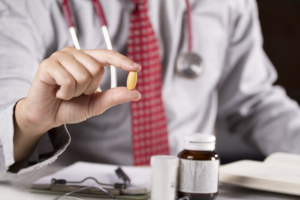
Are Vitamin D and Calcium Supplements Right For You?
At some point in your life, you have probably thought about taking a vitamin supplement. Or perhaps you are entirely dedicated toward crafting your own personal mix of supplements that suit your needs. Either way, you likely know that calcium and vitamin D are both essential to maintaining optimal bone health – and individuals who suffer from deficiencies of either are at an increased risk for brittle bones, fractures, and osteoporosis.
Calcium can be found naturally in dairy products like milk and yogurt, or in many leafy greens. Few foods contain vitamin D, but fatty fish like salmon and sun exposure are two different kinds of natural sources. If you follow a more restrictive diet, you may not be as exposed to these ingredients as is optimal. That is where the supplement debate comes in.
Now trending is a surprising study coming out of orthopedic surgery department at Tianjin Hospital in China that found older adults who took these vitamins in pill form were actually no less likely to break bones than their peers who didn’t.
“We think that improving the lifestyle, getting enough exercise and enough sunshine, and adjusting the diet may be more important than taking these supplements,” lead study author Dr. Jia-Guo Zhao told NBC News about the findings.
Image via Dreamstime

Unfortunately, many say this study doesn’t capture a bigger picture – which has many healthcare professionals worried that even those who need dietary assistance will toss away their vitamin capsules and never look back.
“While this study addresses concerns regarding calcium and vitamin D supplementation, it fails to address or even consider whether the patients in question are obtaining either adequate calcium and vitamin D intake in their diets or sunlight exposure, obviating the need for supplementation,” orthopedic surgeon Dr. Daniel Smith told CBS News.
Read: if these study participants already had enough vitamins naturally, of course they wouldn’t see a difference through ingesting additional pill supplements. But the difference taking a supplement could make in your long term bone health is all the more reason to consider it.
“The potential benefit of calcium and vitamin D supplementation in preventing even a small number of hip fractures far outweighs the otherwise minimum risks associated with routine calcium and vitamin D supplementation in at-risk populations,” Dr. Smith explained.
Image via Dreamstime

Daniel Fabricant, the president of the Natural Products Association, told the Washington Post says “there is a lot missing” in this study, so don’t be too quick to dismiss supplements’ benefits. “People with prior breaks or family incidence of osteoporosis may still need vitamin D,” he advised.
As always, making a change in your diet or supplement intake should be discussed with your own doctor. If you suffer from specific vitamin deficiencies, you can work together to find a plan that incorporates food-based modifications, lifestyle changes, and supplements.
More health supplements news. More winter health stories.

More from Richard



